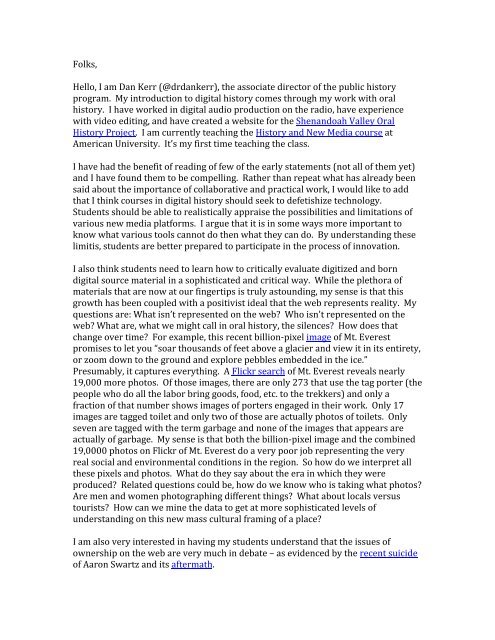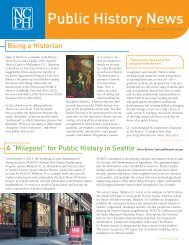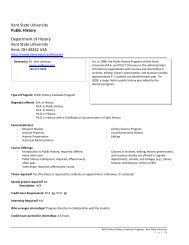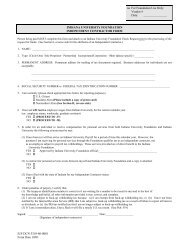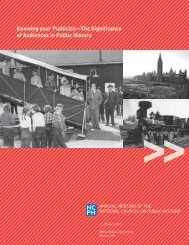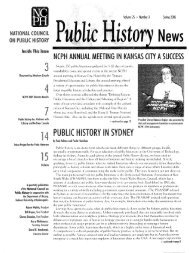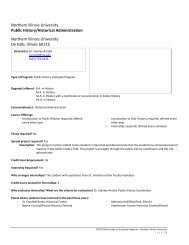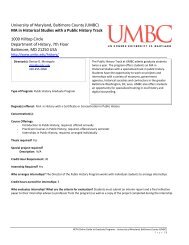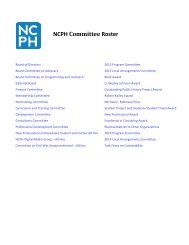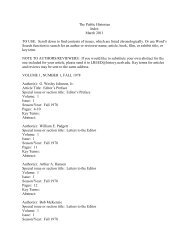Case Statement - National Council on Public History
Case Statement - National Council on Public History
Case Statement - National Council on Public History
Create successful ePaper yourself
Turn your PDF publications into a flip-book with our unique Google optimized e-Paper software.
Folks, <br />
Hello, I am Dan Kerr (@drdankerr), the associate director of the public history <br />
program. My introducti<strong>on</strong> to digital history comes through my work with oral <br />
history. I have worked in digital audio producti<strong>on</strong> <strong>on</strong> the radio, have experience <br />
with video editing, and have created a website for the Shenandoah Valley Oral <br />
<strong>History</strong> Project. I am currently teaching the <strong>History</strong> and New Media course at <br />
American University. It’s my first time teaching the class. <br />
I have had the benefit of reading of few of the early statements (not all of them yet) <br />
and I have found them to be compelling. Rather than repeat what has already been <br />
said about the importance of collaborative and practical work, I would like to add <br />
that I think courses in digital history should seek to defetishize technology. <br />
Students should be able to realistically appraise the possibilities and limitati<strong>on</strong>s of <br />
various new media platforms. I argue that it is in some ways more important to <br />
know what various tools cannot do then what they can do. By understanding these <br />
limitis, students are better prepared to participate in the process of innovati<strong>on</strong>. <br />
I also think students need to learn how to critically evaluate digitized and born <br />
digital source material in a sophisticated and critical way. While the plethora of <br />
materials that are now at our fingertips is truly astounding, my sense is that this <br />
growth has been coupled with a positivist ideal that the web represents reality. My <br />
questi<strong>on</strong>s are: What isn’t represented <strong>on</strong> the web? Who isn't represented <strong>on</strong> the <br />
web? What are, what we might call in oral history, the silences? How does that <br />
change over time? For example, this recent billi<strong>on</strong>-‐pixel image of Mt. Everest <br />
promises to let you “soar thousands of feet above a glacier and view it in its entirety, <br />
or zoom down to the ground and explore pebbles embedded in the ice.” <br />
Presumably, it captures everything. A Flickr search of Mt. Everest reveals nearly <br />
19,000 more photos. Of those images, there are <strong>on</strong>ly 273 that use the tag porter (the <br />
people who do all the labor bring goods, food, etc. to the trekkers) and <strong>on</strong>ly a <br />
fracti<strong>on</strong> of that number shows images of porters engaged in their work. Only 17 <br />
images are tagged toilet and <strong>on</strong>ly two of those are actually photos of toilets. Only <br />
seven are tagged with the term garbage and n<strong>on</strong>e of the images that appears are <br />
actually of garbage. My sense is that both the billi<strong>on</strong>-‐pixel image and the combined <br />
19,0000 photos <strong>on</strong> Flickr of Mt. Everest do a very poor job representing the very <br />
real social and envir<strong>on</strong>mental c<strong>on</strong>diti<strong>on</strong>s in the regi<strong>on</strong>. So how do we interpret all <br />
these pixels and photos. What do they say about the era in which they were <br />
produced? Related questi<strong>on</strong>s could be, how do we know who is taking what photos? <br />
Are men and women photographing different things? What about locals versus <br />
tourists? How can we mine the data to get at more sophisticated levels of <br />
understanding <strong>on</strong> this new mass cultural framing of a place? <br />
I am also very interested in having my students understand that the issues of <br />
ownership <strong>on</strong> the web are very much in debate – as evidenced by the recent suicide <br />
of Aar<strong>on</strong> Swartz and its aftermath.


